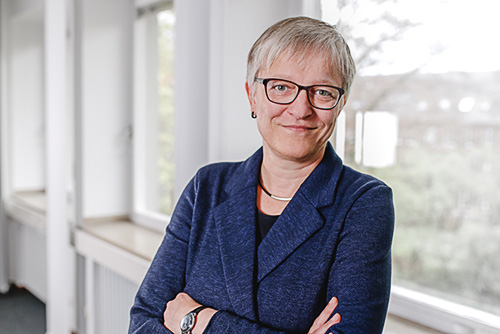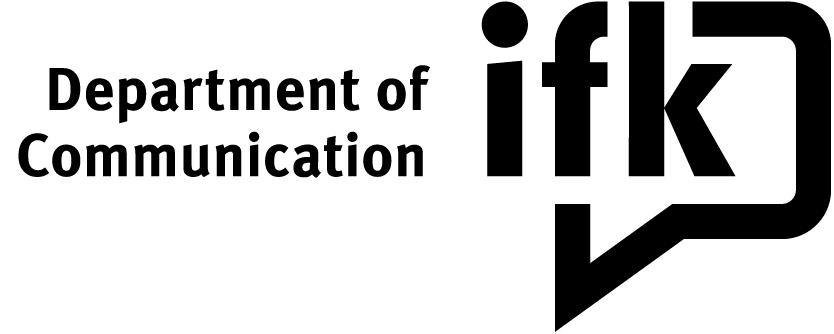What is the difference between Corporate Social Responsibility and Green Washing? What do stakeholders mean by “dialogue”? What kind of internal communication measures do organisations need to support employees during change? And how does non-profit communication succeed? Questions like these are the focus of the four-semester MA in Strategic Communication.
In addition to a basic and specialisation module on strategic communication, students complete a two-semester research module. There, they work on either academic or practice-related questions in the field of strategic communication. To better understand the social context of the programme, two communication science modules focus on the structures and processes of public communication, as well as on journalism and media change. A specialisation module is also used for in-depth study on the Master's degree programme.
Recommended Study Plan MA Strategic Communication

Module 1: Basic Studies: Strategic Communication
The basic module introduces key concepts of strategic communication in two seminars. It looks at communication from both the communicators’ and the audience’s perspectives. Students explore basic ideas, methods, and the academic background of strategic communication using an interdisciplinary approach – especially from communication science, media psychology, and business economics. Building on their existing knowledge of PR, organisational communication, advertising research, media usage, and media impact, students learn how to explore topics in strategic communication. They also practise analysing relevant literature and presenting their findings in a clear and well-structured way.
Possible course topics
- Organisation and communication
- Diffusion, reception, persuasion
Module 2: Quantitative and Qualitative Methods of Empirical Social Research
In this module, students deepen their practical knowledge of quantitative and qualitative methods used in empirical communication research. They also expand their understanding of scientific theory and research logic. Students learn how to apply complex survey and evaluation methods, reflect on them critically, and develop empirical strategies to solve research problems. This module provides the methodological foundation for future research projects in the Master's programme.
Possible course topics
- Multivariate analysis methods: Multivariate Data Analysis - Exercise RStudio
- Specialised research methods or methodology
- Qualitative interviews
- Q-Sort surveys
- Quantitative research in online environments
- (Laboratory) experimental designs
Module 3: Specific Aspects in Strategic Communication
This module builds on the topics covered in the “Basic Studies” module. In three courses, students explore specific aspects of strategic communication, advertising research, and media planning, including their methods and practical applications. They learn how to develop academic approaches and practical procedures, apply them in international contexts, and evaluate them using appropriate methods.
Possible course topics
- The manipulation machinery: communication science perspectives on strategic disinformation
- (Performance) evaluation of communication
- Change communication as a field of research and action in strategic communication
- Basics, fields of application, and perspectives of non-profit communication
Module 4: Research Module: Strategic Communication
In the two-semester research module, students scientifically approach questions from the field of strategic communication. They work independently in groups to develop research questions, create research instruments, and conduct projects. The focus is on analysing problems and developing scientific and practical presentations of the results and solutions. To do so, they use theoretical approaches and empirical methods.
Possible course topics
- Data visualisation in strategic communication. Legitimisation and delegitimisation in strategic communication
- Strategic communication in the local area
- The sense, nonsense, and insanity of online anger
- AI and computational methods in strategic communication research
Module 5: Specialization in Strategic Communication
The specialisation module allows to specialise in empirical research methods (Module 2) or journalism and media change (Module 6). Therefore, students can further develop their skills in research design and methods or analyse the journalistic system and new forms of the public sphere in greater depth.
Possible course topics
Elective module to specialise in Module 2: Quantitative and Qualitative Methods of Empirical Social Research
- Systematic literature review and meta-analysis
- Philosophical thinking methods
- Network analysis
Elective module to specialise in Module 6: Journalism & Media Change
- Innovation in sports journalism
- Crowdsourcing in journalism and beyond
- Digital capitalism
Module 6: Journalism and Media Change
This module focuses on journalism and media change, including related theories and conditions, as well as the impact of technological innovations. They are all key factors in strategic communication. Students analyse developments in journalism, the creation of publicity, new forms of public communication, and how these influence journalistic work. The goal is to understand how the journalistic system and media change work in order to draw conclusions about strategic communication processes and strategies.
Possible course topics
- Social media in politics
- Between participation and polarisation: digital media and (alternative) public spheres
- Sustainability journalism
- Covering Crises in the Media
Module 7: Structures and Processes of Public Communication
This module focuses on theories and developments in public communication and their social framework conditions, which are key contexts for strategic communication.
Public communication is seen as a process of constant change. Students explore concepts such as public sphere, actors, and organisations, as well as issues like fragmentation, medialisation, and counter-publics. They use this knowledge to analyse and understand the structures and ways strategic communication works.Example events
- Communication and participation in the digital age
- Strategic disinformation campaigns: backgrounds, approaches, and effects
- Science competing for attention: truth under the conditions of media change
- Communication and participation in the digital age
Module 8: Master-Thesis
This module supports students as they work on their Master's thesis. In the examination colloquium, students present and discuss their topics and reflect on key aspects such as methodology, theory, and working techniques. The aim is to plan, conduct, and document an independent research project within a set timeframe. To do so, students should use good scientific methods and develop well-founded conclusions that can be placed in a broader academic context.
- Examination colloquium (individually organised by the supervisors of the Master's thesis; further information on the examination module can be found here)
You can find the courses in the electronic course catalogue of the University of Münster. Questions about registering for and cancelling examinations are answered in our FAQ.
The module structure may vary depending on when you started the programme, as different examination regulations apply to different student cohorts. All collected examination regulations (in the various versions) can be found at "Forms and downloads".
Degree
To successfully complete the Master's degree programme, students must earn 120 credit points through the modules they study. Of these, 25 credit points are awarded for the Master's thesis and 5 credit points for the examination colloquium, which is part of the Master's module. Further information on the examination module can be found here.
Application and Enrolment
The degree programme starts each year in the winter semester, i.e. in October. Information on admission and application processes can be found on the department's information pages. We offer places for around 18 students each year.
Head of the Master's Degree in Strategic Communication (MA)

Prof. Dr. Ulrike Röttger
Department of Communication
Room: E 212
Bispinghof 9-14
D-48143 Münster
ulrike.roettger@uni-muenster.de

